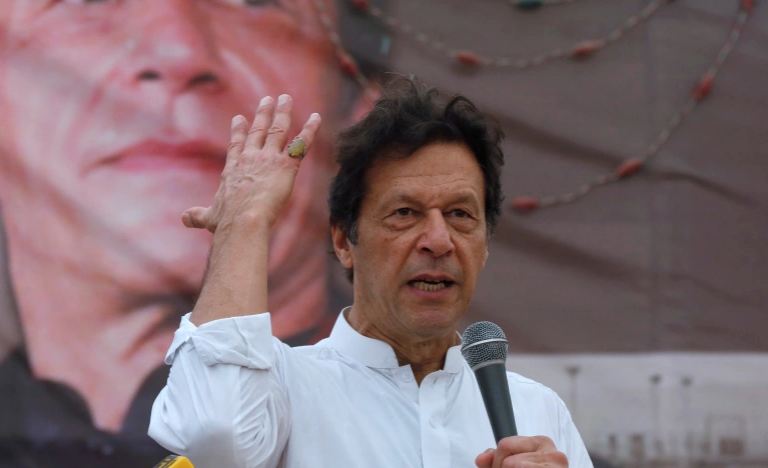Alwaght- Pakistan’s Prime Minister Imran Khan was ousted on Sunday when losing a no-confidence vote in the parliament.
The vote came after hours of impasse that even resulted in the resignation of the speaker of the lower house. Now, a caretaker government will lead the country until new general elections are held.
The no-confidence vote came after a nearly 14-hour standoff between the opposition and Khan's ruling party that started on Saturday morning.
According to the House speaker, Sardar Ayaz Sadiq, opposition parties were able to secure 174 votes in the 342-member house in support of the no-confidence motion, making it a majority vote. There were just a few legislators of Khan's ruling party present for the process.
The vote means Khan will no longer hold office and the country's lower house will now elect a new prime minister and government.
Following the no-confidence vote, the acting speaker of the Pakistani parliament's lower house said the legislature will meet on Monday to vote for a new prime minister.
Ayaz Sadiq, who was presiding over the assembly session in the absence of the ruling party members and its designated speakers,
said nomination papers for candidates should be filed by 11:00am local time (0600 GMT) on Sunday.
Opposition leader Shehbaz Sharif says he is almost certain to be picked to lead the nuclear-armed nation of 220 million people after weeks of high political drama.
In order to avoid a no-confidence vote, Khan, 69, had asked the president to dissolve the parliament and called for a fresh election. Pakistan’s Supreme Court, however, ruled all his actions illegal last week, and ordered the assembly to reconvene and vote.
The top court received a slew of petitions after the deputy speaker of the lower house of parliament refused to allow a no-confidence motion brought by the joint opposition against the Khan administration.
The deputy speaker declared the motion unconstitutional, saying it is part of a plot by what he called “foreign powers” to interfere in Pakistan’s democracy. Simultaneously, President Arif Alvi dissolved the parliament on the prime minister’s advice.
During that parliament session and for the first time in the history of Pakistan's parliament, the country's parliamentarians chanted "Death to America" as the legislature rejected the no-confidence vote.
On Friday, Khan said he accepted the Supreme Court ruling that ordered that the country’s parliament can go ahead with a no-confidence vote against him.
"We have accepted the verdict of the Supreme Court, but I am very disappointed because unfair things are happening openly in Pakistan, and no one is taking it seriously," he said an address to the nation.
No prime mister has ever served a full term in Pakistan, but Khan is the first to lose office through a vote of no confidence.
Last Sunday, Khan named the senior US government official behind the controversial letter that threatened to overthrow Khan’s Pakistan Tehreek e Insaf (PTI) government.
Addressing a meeting of party leaders in Islamabad after the no-trust motion against him was dismissed in the country’s parliament; Khan said that during the national security committee's (NSC) meeting, foreign interference was noted in the internal politics of the country through a no-confidence motion.
He went on to mention the name of Donald Lu, the top American official dealing with South Asia in the US State Department, as the person involved in the ‘foreign conspiracy' to topple his government.
The embattled premier claimed that Lu had warned the Pakistani envoy to the US, Asad Majeed, that there would be "implications" if Khan survived the no-trust vote in the National Assembly, the lower house of the parliament.
He further said that minutes of the communiqué regarding a meeting between the ambassador of Pakistan in the US and the US officials were shared in the NSC meeting.
Khan said the embassy officials of the US were also in contact with the PTI members who had defected, reiterating that the no-confidence motion against him was a “foreign conspiracy”.
Just a day before, Khan had openly and defiantly held the US responsible for the “foreign conspiracy” to overthrow his government.
“Ok I'm taking the name of US, the conspiracy has been hatched with the help of America to remove me,” he told his party colleagues in Islamabad.
The cricketer-turned-politician has been accused by the opposition of mishandling the economy and foreign policy since coming to power in 2018.
His embattled government has been banking on the International Monetary Fund to release a 6 billion-dollar rescue package, but the move has been obstructed by the US.
Pakistan minister: Our subservience to US will continue
Following the vote, Pakistan’s minister for human rights, Shireen Mazari, took to Twitter accusing “US regime” of being successful in outing Khan’s government with the help of “a corrupt political mafia,” calling it a "sad day for democracy."
She accused the country’s legislature of a “judicial coup,” which “has destroyed parliamentary supremacy.”
“So our deep-seated subservience to [the] US will continue,” she said.
In another tweet on Saturday, she explicitly accused the US of “regime change” in Pakistan.
Mazari said Washington was pursuing that goal with the help of a “corrupt mafia ready to lay prostrate before their US masters!”



























